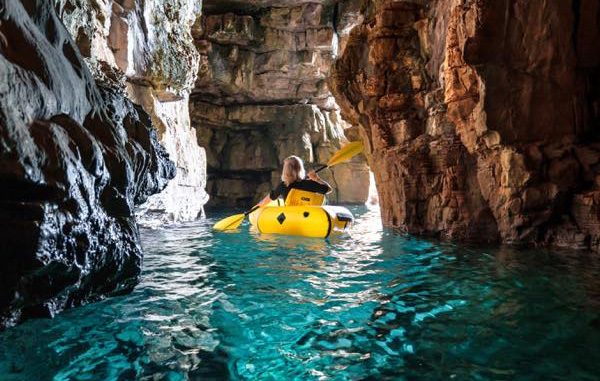Since launching packable raft manufacturer Kokopelli in 2012, Denverite Kelley Smith has heard a steady stream of wild tales from customers.
A group used Kokopelli packrafts on a backcountry ski trip to British Columbia, where they helicoptered into an ice field, traversed a glacier, hiked down to a river and rafted to the ocean. Another customer took them to the Northwest Territories for a weeklong climbing trip.
“The access is so remote that you can’t just go climb there,” said Smith, 34. “A lot of people are using packrafts to access areas that are otherwise (unreachable).”
Now, Kokopelli has launched a $30,000 Kickstarter campaign for the Rogue, its lightest and most durable packraft to date.
“We’ve been working on this for over a year … The Rogue is a culmination of everything we’ve learned in the past three years,” Smith said. Most of the money will go toward production and marketing, he said.
The Rogue is a yellow packraft weighing 5 pounds and rolling up into the size of a paper towel roll. Smith said the company’s previous model weighed 7.5 pounds.
Kokopelli used Kevlar – the durable, lightweight material used in bulletproof vests – to reinforce the floor of the boat, which includes an airtight zipper for waterproof storage. Rafters use an inflation bag that fills the raft with air in three minutes.
“The weight and compactness of our boat is like no other,” Smith said. “That’s a result of the construction method and the materials used … We got a more durable boat to the weight of the lightest boat.”
Kokopelli is discontinuing two models to make room for its Rogue, which can come with a spray deck. It also makes a two-person packraft and a whitewater packraft, but the Rogue series is designed for bike-packing, adventure racing and other backcountry expeditions. On its Kickstarter page, the Rogue starts at $625.
Smith, along with co-founders Alan Cummings and Nick Rubino, grew up in Colorado and started Kokopelli in his garage in 2012. The company has sold more than 1,000 packrafts and expanded to 12 countries, he said.
Kokopelli manufactures in Hong Kong and has landed 40 retailers, including Denver’s downtown REI and Confluence Kayaks. It has an office at coworking space Wayfnder.
Smith has two other full-time employees, but stills tinkers in a garage with new prototypes. Kokopelli sold its first packraft in 2014.
“Packrafting has been largely underground for the past 20 years,” he said. “It was once the sport of this ultra-hardcore adventure community, but now it’s more mainstream.”
Kokopelli’s main goal is to promote multi-sport outdoor activities, whether that’s strapping a mountain bike or skis onto rafts or bringing along fishing or climbing gear.
“They are meant to be the gateway vessel into watersports,” Smith said, adding that packrafts are easier to use than kayaks or other boats that require more technical knowledge.
More Colorado packraft reading:
Raft maker doubles space in S.W. CO; readies design improvements
Since launching packable raft manufacturer Kokopelli in 2012, Denverite Kelley Smith has heard a steady stream of wild tales from customers.
A group used Kokopelli packrafts on a backcountry ski trip to British Columbia, where they helicoptered into an ice field, traversed a glacier, hiked down to a river and rafted to the ocean. Another customer took them to the Northwest Territories for a weeklong climbing trip.
“The access is so remote that you can’t just go climb there,” said Smith, 34. “A lot of people are using packrafts to access areas that are otherwise (unreachable).”
Now, Kokopelli has launched a $30,000 Kickstarter campaign for the Rogue, its lightest and most durable packraft to date.
“We’ve been working on this for over a year … The Rogue is a culmination of everything we’ve learned in the past three years,” Smith said. Most of the money will go toward production and marketing, he said.
The Rogue is a yellow packraft weighing 5 pounds and rolling up into the size of a paper towel roll. Smith said the company’s previous model weighed 7.5 pounds.
Kokopelli used Kevlar – the durable, lightweight material used in bulletproof vests – to reinforce the floor of the boat, which includes an airtight zipper for waterproof storage. Rafters use an inflation bag that fills the raft with air in three minutes.
“The weight and compactness of our boat is like no other,” Smith said. “That’s a result of the construction method and the materials used … We got a more durable boat to the weight of the lightest boat.”
Kokopelli is discontinuing two models to make room for its Rogue, which can come with a spray deck. It also makes a two-person packraft and a whitewater packraft, but the Rogue series is designed for bike-packing, adventure racing and other backcountry expeditions. On its Kickstarter page, the Rogue starts at $625.
Smith, along with co-founders Alan Cummings and Nick Rubino, grew up in Colorado and started Kokopelli in his garage in 2012. The company has sold more than 1,000 packrafts and expanded to 12 countries, he said.
Kokopelli manufactures in Hong Kong and has landed 40 retailers, including Denver’s downtown REI and Confluence Kayaks. It has an office at coworking space Wayfnder.
Smith has two other full-time employees, but stills tinkers in a garage with new prototypes. Kokopelli sold its first packraft in 2014.
“Packrafting has been largely underground for the past 20 years,” he said. “It was once the sport of this ultra-hardcore adventure community, but now it’s more mainstream.”
Kokopelli’s main goal is to promote multi-sport outdoor activities, whether that’s strapping a mountain bike or skis onto rafts or bringing along fishing or climbing gear.
“They are meant to be the gateway vessel into watersports,” Smith said, adding that packrafts are easier to use than kayaks or other boats that require more technical knowledge.
More Colorado packraft reading:
Raft maker doubles space in S.W. CO; readies design improvements



Leave a Reply